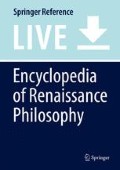Abstract
In Renaissance philosophy, the term “mind” is mostly used to indicate the unity of the cognitive processes governing speculative activity in a non-discursive way. Mind is always distinguished from reason, which indicates the reworking process of the sensitive species provided by the senses and of the Fantasmata provided by the imagination. Some Platonic scholars use the term “mind” as a synonym for “intellect,” while for the Averroist ones, it stands for the unity of the intellectual faculties. During this period Augustine’s notion of mind-soul has been philosophically reworked along with an effort at combining it with the Aristotelian model (intellectual powers). Some Renaissance philosophers have rejected Augustine’s notion to devise new original conceptions of mind-soul, reworking the late ancient philosophy, such as the Alessandrinists. Averroist philosophers from the Universities of Paris, Padua, and Bologna have also affirmed the doctrine of the mortality of mind-soul.
References
Primary Literature
Bruno, Giordano. 1582. De umbris idearum, ed. Rita Sturlese. 1991. Firenze: Olschki.
Cusanus, Nicolaus. 1450. Idiota de mente. In Nicolai de Cusa Opera omnia iussu et auctoritate academiae litterarum Heidelbergensis ad codicum fidem edita, in aedibus Felicis Meiner, ed. Ludwig Baur. 1937. V. Lipsia: Meiner Verlag.
della Mirandola, Pico. 1486. Oratio de hominis dignitate. In Dignità dell’uomo, ed. Bruno Cicognani. 1942. Firenze: Le Monnier.
Ficino, Marsilio. 1484. Theologia Platonica de immortalitate animorum, ac aeterna foelicitate libri octodecim. In Platonic theology, ed. Michael J.B. Allen and James Hankins. 2001–2006. Cambridge, MA: Harvard University Press.
Pomponazzi, Pietro. 1516. De immortalitate animae. In Abhandlung über die Unsterblichkeit der Seele, ed. Burkhard Mojsisch. 1990. Hamburg: Meiner Verlag.
Secondary Literature
Allen, Michael J.B. 2010. Marsilio Ficino on Saturn, the Plotinian mind and the monster of Averroes. Bruniana & Campanelliana 16 (1): 11–29.
Ciliberto, Michele. 1996. Senso e intelletto nei dialoghi di Bruno. In Sensus/Sensatio. VIII Colloquio Internazionale del Lessico Intellettuale Europeo (Roma, 6–8 gennaio 1995), ed. Massimo Luigi Bianchi, 199–214. Firenze: Leo S. Olschki.
Duclow, Donald. 1990. Mystical theology and intellect in Nicholas of Cusa. American Catholic Philosophical Quarterly 64 (1): 111–129.
Flasch, Kurt. 1980. Nikolaus von Kues und Pico della Mirandola. Mitteilungen und Forschungsbeiträge der Cusanus-Gesellschaft 14: 113–120.
Forlivesi, Marco. 2013. La filosofia universitaria tra il XV e il XVII secolo. Padova: CLEUP.
Martin, Craig. 2013. Humanism and the assessment of Averroes in the renaissance. In Renaissance Averroism and its aftermath: Arabic philosophy in early modern Europe, ed. Anna Akasoy and Guido Giglioni, 65–80. Dordrecht: Springer.
Meier-Oeser, Stephan. 1989. Die Präsenz des Vergessenen. Zur Rezeption der Philosophie des Nicolaus Cusanus vom 15. bis zum 18. Jahrhundert. Münster: Aschendorff Verlag.
Monfasani, John. 1976. George of Trebizond: A biography and a study of his rhetoric and logic. Leiden: E.J. Brill.
Mulsow, Martin. 2002. Moderne aus dem Untergrund: Radikale Frühaufklärung in Deutschland 1680–1720. Hamburg: Meiner Verlag.
Perrone Compagni, Vittoria. 2005. Mens, intellectus, ratio: scala dell’essere e modi di conoscenza in Pietro Pomponazzi, In Per una storia del concetto di mente I, ed. Eugenio Canone, 207–240. Lessico intellettuale europeo 99. Firenze: Leo S. Olschki.
Rabassini, Andrea. 2007. Mente divina, intelligenze angeliche e anima umana. Il concetto di mens in alcuni contesti ficiniani. In Per una storia del concetto di mente II, ed. Eugenio Canone, 57–82. Lessico intellettuale europeo 103. Firenze: Leo S. Olschki.
Spruit, Leen. 2013. Intellectual beatitude in the Averroist tradition: The case of Agostino Nifo. In Renaissance Averroism and its aftermath: Arabic philosophy in early modern Europe, ed. Anna Akasoy and Guido Giglioni, 125–144. Dordrecht: Springer.
Tirinnanzi, Nicoletta. 2000. Umbra naturae. In L’immaginazione da Ficino a Bruno. Roma: Edizioni di Storia e Letteratura.
Valverde, José Manuel Garcia. 2012. El intelecto agente en Pietro Pomponazzi: un análisis de su presencia en el Tractatus de immortalitate animae y en la Apología. Anuario filosofico 45 (/3): 545–566.
Author information
Authors and Affiliations
Corresponding author
Editor information
Editors and Affiliations
Section Editor information
Rights and permissions
Copyright information
© 2019 Springer Nature Switzerland AG
About this entry
Cite this entry
Fiamma, A. (2019). Mens. In: Sgarbi, M. (eds) Encyclopedia of Renaissance Philosophy. Springer, Cham. https://doi.org/10.1007/978-3-319-02848-4_1022-1
Download citation
DOI: https://doi.org/10.1007/978-3-319-02848-4_1022-1
Received:
Accepted:
Published:
Publisher Name: Springer, Cham
Print ISBN: 978-3-319-02848-4
Online ISBN: 978-3-319-02848-4
eBook Packages: Springer Reference Religion and PhilosophyReference Module Humanities and Social SciencesReference Module Humanities

